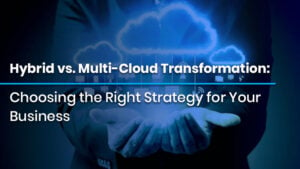
How to Strengthen Security Using CIS Controls and Posture Analysis
How to Strengthen Security Using CIS Controls and Posture Analysis Introduction In the fast-paced and ever-evolving world of cybersecurity, defending digital infrastructure goes far
🔥Premium Monthly Plan – Only $11.99!🔥Hurry! This exclusive deal won’t last long. 👉 Subscribe Now!

How to Strengthen Security Using CIS Controls and Posture Analysis Introduction In the fast-paced and ever-evolving world of cybersecurity, defending digital infrastructure goes far

How to Prepare for the AWS Data Engineer Exam Introduction With the world becoming increasingly data-driven, organizations are depending on cloud-based systems to store, process,

Hybrid vs. Multi-Cloud Transformation: Choosing the Right Strategy for Your Business Introduction In the digital-first economy of today, cloud transformation is no longer a
Table of Contents
In today’s hyperconnected world, technology has become an indispensable part of our daily lives, transforming how we communicate, work, and access information. While technology has undoubtedly brought about advancements and conveniences, it has also raised concerns about its potential impact on our well-being. The pervasiveness of digital devices and the constant influx of information can contribute to stress, anxiety, and social isolation. As we move forward into an increasingly tech-saturated world, it is crucial to consider how we can harness the benefits of technology while safeguarding our well-being. In this article, you will understand the ongoing exploration of how technology can be harnessed to enhance and promote well-being while addressing potential challenges posed by our increasingly tech-driven era.
Among platforms facilitating education and guidance in technology, IPSpecialist stands out for its diverse array of courses in Cloud Computing, Cybersecurity, Artificial Intelligence (AI), and Networking. IPSpecialist offers online training and career support, serving as a centralized hub for individuals seeking knowledge and professional advancement. In this blog we will explore Future of Well-Being in a Tech-Saturated World.
Technology may be a very effective tool for customization. Employee engagement platforms and human resource software can collect data and insights on individual employees, allowing firms to tailor their strategies. For example, understanding an employee’s job preferences, career ambitions, and hobbies can enable HR teams to deliver individualized development plans, fostering a sense of belonging and commitment.
Employee engagement requires recognition and rewards. Technology can automate and streamline recognition programs, making recognizing and rewarding employees’ accomplishments easier.
Professional growth is now more accessible than ever due to online learning platforms and e-learning courses. Encourage your staff to take advantage of these possibilities to advance in their positions. Facilitate mentorship programs, where experienced employees can guide and support their colleagues, assisting in developing personal relationships inside the firm.
It is critical to address employee well-being in the digital age. While remote work is handy, it can occasionally lead to feelings of isolation. Use technology to provide wellness initiatives, mental health services, and online forums where employees may share their experiences and seek help.
As technology continues to play a central role in our lives, digital wellness will be increasingly emphasized. These include strategies to maintain a healthy balance between online and offline activities.
Tools and applications that promote mindfulness, screen time management, and digital detoxing may become more prevalent.
Advances in health technology, including wearables, health apps, and telemedicine, can empower individuals to take a more active role in managing their well-being.
Personalized health plans based on individual data and preferences may become more common, allowing people to address their specific health and wellness needs proactively.
The ethical implications of technology on well-being will be a central focus. Ensuring that tech innovations prioritize user well-being, privacy, and security will become increasingly important.
Society may demand more transparent and accountable tech practices, leading to the development of ethical frameworks and regulations.
Technology is likely to play a significant role in addressing mental health challenges. Virtual therapy, mental health apps, and AI-driven mental health assessments could become more widespread.
However, ethical considerations regarding data privacy and the responsible use of AI in mental health interventions will need careful attention.
Promoting digital literacy and educating individuals on the responsible use of technology will be crucial. These include understanding the impact of social media, managing information overload, and recognizing online threats to mental well-being.
Educational institutions and organizations may integrate well-being education into curricula to equip individuals with the skills to navigate the digital landscape.
Future tech developments should prioritize human-centric design principles, considering users’ psychological and emotional well-being.
Incorporating features that enhance user experience without compromising mental health will be essential for the success and acceptance of new technologies.
Despite the rise of digital connectivity, fostering real-world community and interpersonal relationships will remain vital for well-being.
Innovations that strengthen local communities, encourage face-to-face interactions, and combat social isolation may gain importance.
As technology evolves, there will be a growing awareness of its environmental impact. Sustainable and eco-friendly tech solutions may become more prevalent to align with a holistic view of well-being, including the planet’s health.
In shaping the future of well-being in a tech-saturated world, individuals, technology developers, policymakers, and society must collaborate to find a balance that maximizes the benefits of technology while mitigating its potential harms. It involves fostering a mindful and ethical approach to technological innovation and usage.
Advancements in technology are set to impact well-being in 2024 significantly. Here’s what to expect:
As technology continues to evolve, it is essential to discuss its impact on well-being proactively. Policymakers, educators, and technology developers must collaborate to create a digital environment that supports human flourishing.
We can shape a future where technology enhances our well-being by prioritizing ethical design principles, promoting digital literacy, and fostering responsible technology usage habits. By harnessing the power of technology while safeguarding our physical, mental, and emotional health, we can create a world where technology serves as a tool for empowerment and well-being for all.
© 2025 All rights reserved | Privacy Policy | Terms and Conditions | Sitemap | Cookie Policy




